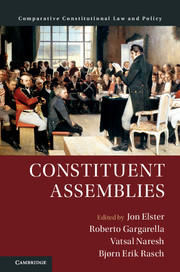(image source: CUP)
Comparative constitutional law has a long pedigree, but the comparative study of constitution-making has emerged and taken form only in the last quarter-century. While much of the initial impetus came from the study of the American and French constituent assemblies in the late eighteenth century, this volume exemplifies the large comparative scope of current research. The contributors discuss constituent assemblies in South East Asia, North Africa and the Middle East, Latin America, and in Nordic countries. Among the new insights they provide is a better understanding of how constituent assemblies may fail, either by not producing a document at all or by adopting a constitution that fails to serve as a neutral framework for ordinary politics. In a theoretical afterword, Jon Elster, an inspirational thinker on the current topic, offers an analysis of the micro-foundations of constitution-making, with special emphasis on the role of crises-generated passions.Table of contents:
1. Introduction Jon Elster, Roberto Gargarella, Vatsal Naresh and Bjørn Erik RaschMore information here.
2. Constitution-making in the context of plural societies: The 'accumulation strategy' Roberto Gargarella
3. Constituent assemblies in democratic regimes: the problem of a legally limited convention Gabriel L. Negretto
4. Constituent assemblies and political continuity in divided societies Hanna Lerner
5. Constituent assembly failure in Pakistan and Nepal Mara Malagodi
6. Precautions in a democratic experiment: the nexus between political power and competence Udit Bhatia
7. A race against time: the making of the Norwegian Constitution of 1814 Jon Elster
8. Chain of legitimacy: constitution-making in Iceland Thorvaldur Gylfason
9. Constitution-making and legislative involvement in government formation Cristina Bucur, José Antonio Cheibub, Shane Martin and Bjørn Erik Rasch
10. The political psychology of constitution-making Jon Elster
(source: Legal History Blog)


No comments:
Post a Comment
Note: Only a member of this blog may post a comment.